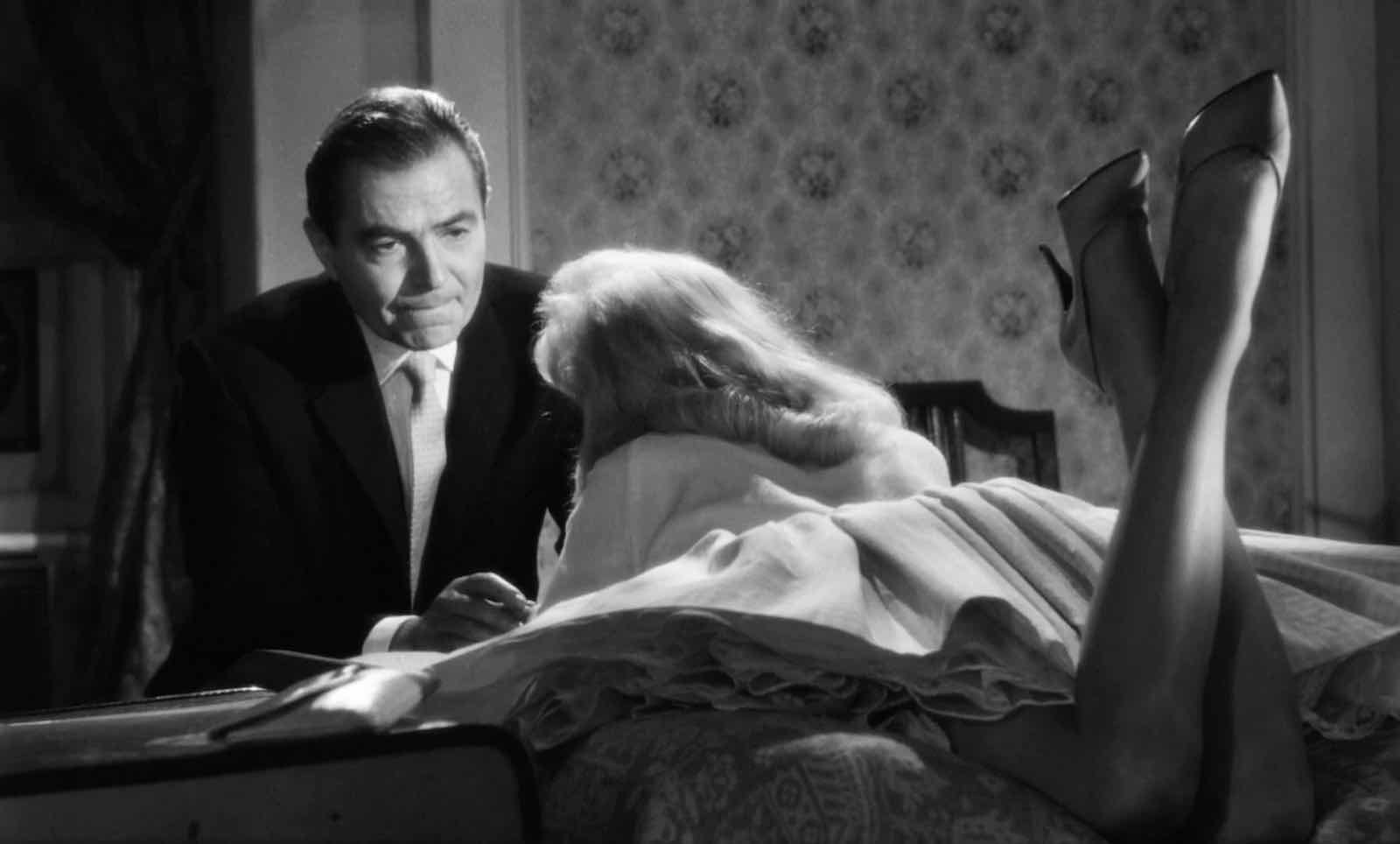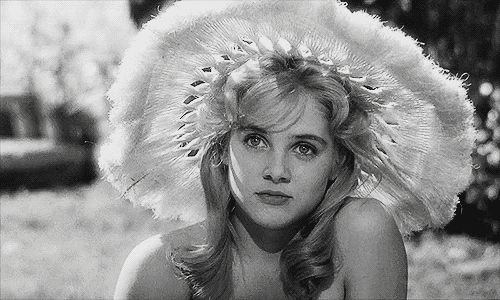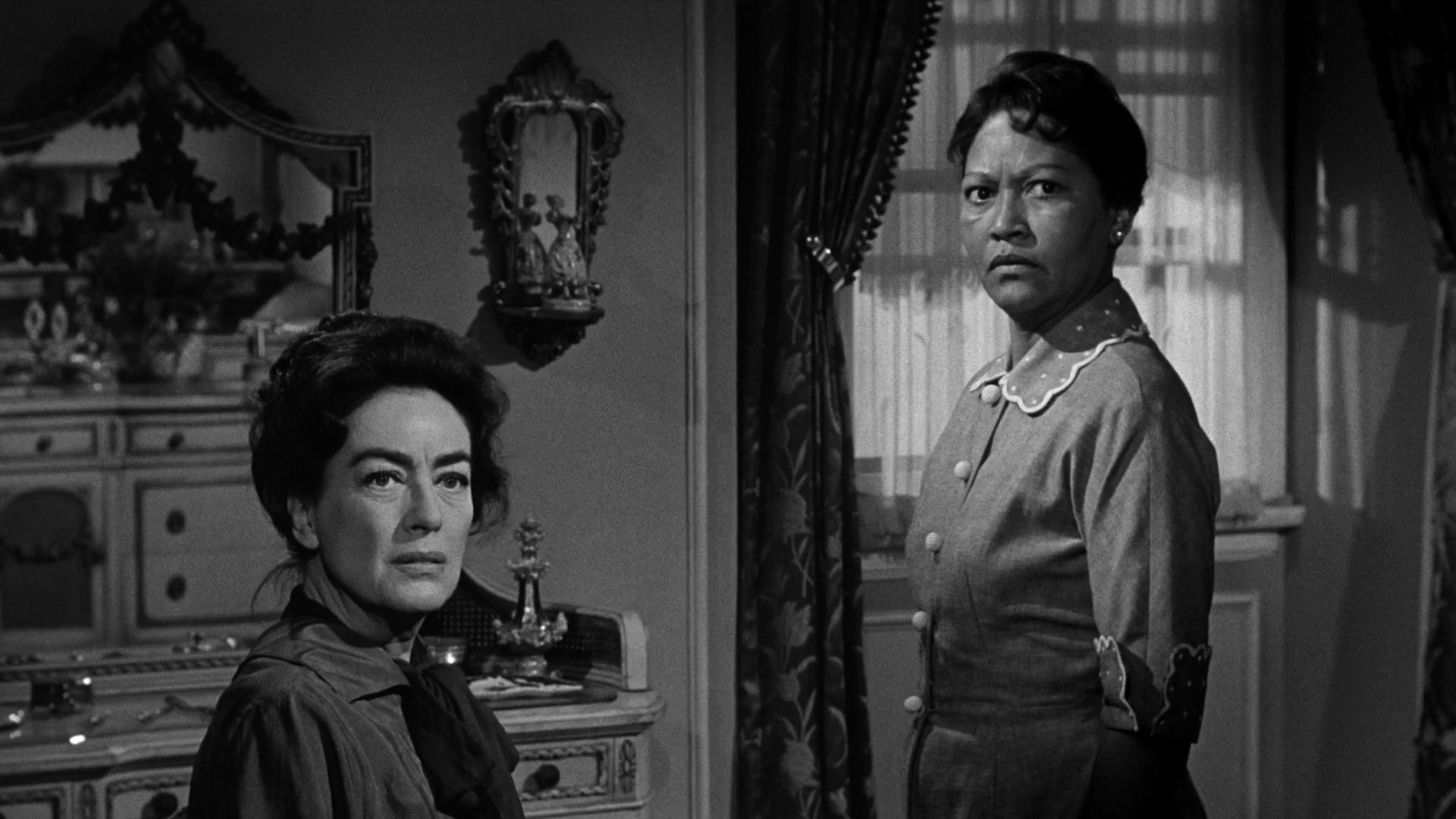my favorite movies of 1962:
(1) Lolita
(2) The Man Who Shot Liberty Valance
(3) Le Doulos
(4) What Ever Happened to Baby Jane?
favorite of 1962:
Lolita(James Mason, Sue Lyon, Peter Sellers, Shelley Winters. Directed by Stanley Kubrick.)This movie’s trailer asked: “How did they ever make a movie of Lolita?” In other words, how was it possible to adapt Nabokov’s 1955 novel about a man who sexually abuses his 12-year-old stepdaughter, considering how heavily censored movies were back in 1962?
First, they made her older, a high-school student. Then, Kubrick made a dark comedy-drama that avoids being overtly sexual or erotic, instead focusing on the often-disconcerting interactions among four fascinating characters:
• James Mason is a middle-aged professor who becomes creepily obsessed with a teenage girl.
• Sue Lyon is the girl who’s preyed upon but asserts her will.
• Shelley Winters is the desperate, melodramatic, beleaguered mother and wife.
• Peter Sellers steals the show as the elusive man who keeps popping up in unexpected places, adopting a variety of comically incongruous personas.
Stream Lolita on Tubi (free with ads) or these sites.
2nd favorite of 1962:
The Man Who Shot Liberty Valance
(James Stewart, John Wayne, Lee Marvin, Vera Miles, Edmond O’Brien, Andy Devine, Woody Strode. Directed by John Ford.)
Like Double Indemnity (my favorite movie of 1944), The Man Who Shot Liberty Valance is told mostly in flashback, and it partly spoils itself at the beginning, leaving us intrigued to find out the whole story.
From the beginning, we know that Jimmy Stewart’s character, Ransom “Ranse” Stoddard, has ended up as a respected Senator, while John Wayne’s character, Tom Doniphon, has died decades after the main events of the movie. We also know that Doniphon is unknown to the general public but revered by the Senator and others who knew him. Of course, the title of the movie tells us that Liberty Valance (Lee Marvin) will be shot. But what does any of this have to do with the heated debate over whether their territory in the 19th century should become a state?
The Man Who Shot Liberty Valance probably had to come out right around the time it did. If it had come out 10 years earlier, it would’ve had more of the look and feel of a classic Western; instead, it’s a “revisionist Western” that feels more world-weary and self-conscious about its own genre and setting and myth-making. (The movie’s most famous line is: This is the West, sir. When the legend becomes fact, print the legend.) But it also came out early enough for World War II to be in recent memory, underlying the movie’s subtext about those who take up arms for a just cause. The movie might not have gone over so well had it come out a little later, during the protests against the Vietnam War.
This is a rare movie where the title is said only by a bit player. The title drop resonated with me long after watching it.
Watch Mia Tiffany watching The Man Who Shot Liberty Valance for the first time:
Stream The Man Who Shot Liberty Valance on Amazon Prime.
3rd favorite of 1962:
[French]
(Jean-Paul Belmondo, Serge Reggiani, Fabienne Dali, Philippe Nahon, Michel Piccoli. Directed by Jean-Pierre Melville.)
This French noir is by Jean-Pierre Melville, who would later direct Le Samouraï (my favorite movie of 1967). Le Samouraï is the better-known movie, but Le Doulos is more overtly entertaining, with a plot that keeps us guessing about who can be trusted while the body count keeps piling up. It seems easier to spot a liar than a truth-teller in the murky underworld of Le Doulos.
The movie starts by telling us that the title Le Doulos literally refers to a hat, but it’s police lingo for an informant. Le Doulos keeps us asking questions like: who’s informing, and what’s the information, and why?
Le Doulos is both fun and challenging to watch. There’s a lot to keep track of, and I didn’t catch it all the first time. But the challenge is worth it; this is an engaging and outstanding crime movie.
Stream Le Doulos on Plex (free with ads) or these sites.
4th favorite of 1962:
What Ever Happened to Baby Jane?
(Bette Davis, Joan Crawford, Victor Buono, Maidie Norman. Directed by Robert Aldrich.)
What Ever Happened to Baby Jane? stars real-life rivals Bette Davis and Joan Crawford. Bette Davis plays Jane Hudson, an alcoholic who mourns her former stardom that burnt out in childhood. She’s insanely jealous of her sister, Blanche Hudson, played by Joan Crawford, who grew up to outshine Jane as a glamorous young Hollywood star. (We see movie clips of the real Joan Crawford and Bette Davis in their younger days.) Decades later, Blanche is in a wheelchair, being held hostage by Jane on the second floor of their house. The result is like a combination of Sunset Boulevard (one of my favorite movies of 1950) and Misery (one of my favorites of 1990) … with a devious twist that I won’t give away.
Maidie Norman, a black actress who plays their maid, objected that her dialogue was written in the screenplay as a “doltish, yessum character” who spoke in “old slavery-time talk.” She rewrote her own dialogue to be strong and smart, but she wasn’t credited as a writer.
Seinfeld paid tribute to What Ever Happened to Baby Jane? in the season 4 episode “The Airport.” But ya are, Blanche!
Watch Mia Tiffany watching What Ever Happened to Baby Jane?:
Stream What Ever Happened to Baby Jane? on these sites.
Click here for the full list of my favorite movie(s) of each year from 1920 to 2020.












Comments
Post a Comment
Thanks for submitting a comment on my movie blog! 🎬 Your comment won’t show up here right away. 😐 To make sure your comment gets seen, I recommend sharing this post on social media and saying whatever you feel like! 🤓